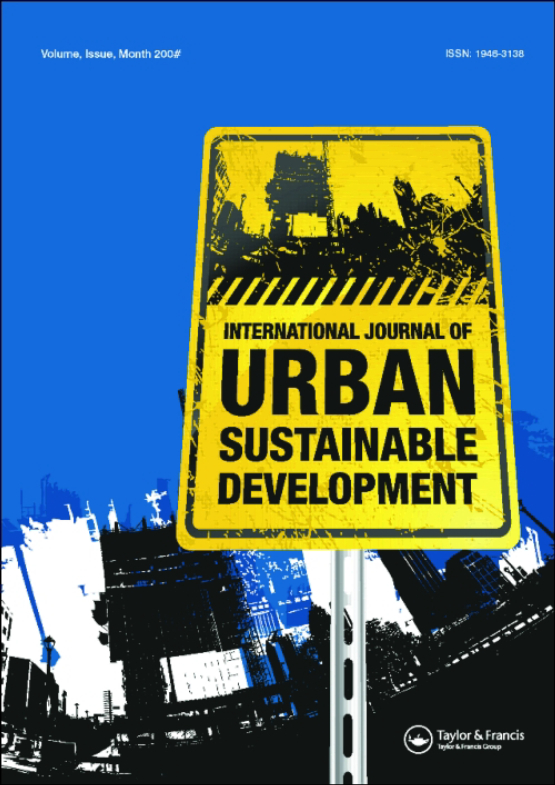Submit a Manuscript to the Journal
International Journal of Urban Sustainable Development
For an Article Collection on
Digitalisation of Territories and Technopolitics of Urban Development
Manuscript deadline


Article collection guest advisor(s)
André Pasti,
Federal University of ABC (UFABC)
andre.pasti@ufabc.edu.br
Mónica Arroyo,
University of São Paulo (USP, Brazil)
mmarroyo@usp.br
Digitalisation of Territories and Technopolitics of Urban Development
The digitalisation of territory is a process that has intensified and become more widespread since the 2000s, driven by the growing complexity of interconnected technical objects—especially those linked to digital networks (the physical and logical infrastructures that enable the transmission of data packets). Alongside the popularisation of various devices (such as smartphones, laptops, and tablets) and the ease of connectivity offered by digital technologies, the use of applications (software designed for a wide range of functions) has become embedded in everyday life. These apps are now used across numerous domains, including finance, commerce, transport, logistics, deliveries, accommodation, education, health, sports, music, and many others that capture, process, and transmit data. Platforms that enable the economic exploitation of data have emerged as a new business model, acting as intermediaries between groups connected through digital networks. As a result, new actors have appeared in territorial power relations, and urban development is increasingly shaped by digitalisation. The technopolitical perspective offers a way to understand the interweaving and hybridity of technology and politics in today’s sociotechnical struggles. In this context, it is crucial to examine the technopolitics of urban development, as well as the new forms, conflicts, trends, and contradictions that accompany the digitalisation of territory.
The trend towards the differentiation and increasing complexity of territorial uses is increasingly linked to information, a key variable of contemporary capitalism, especially as digitalisation has become an irreversible process permeating various aspects of productive and social life. At the same time, digitalisation has deepened a contradictory process in territories on the periphery of capitalism, marked by the emergence of new socio-spatial inequalities in cities. Simultaneously, it has also enabled a range of grassroots mobilisation strategies, as populations appropriate information technologies, making alternative forms of territorial use possible, with a plurality of everyday expressions in both the economy and culture. These tensions are evident in urban development practices and territorial planning efforts, which are increasingly seeking to incorporate digital technologies into decision-making processes and the mediation of urban services.
We invite scholars, researchers, and practitioners to contribute original research on Digitalization of Territories and Technopolitics of Urban Development. Topics of interest include, but are not limited to:
- Socio-spatial inequalities resulting from digitalisation processes in metropolitan areas
- Technopolitics of hegemonic and counter-hegemonic practices in urban development within the context of the adoption of new information and communication technologies
- Dynamics of communication networks in urban spaces in the context of digitalisation
- Transformations in circulation and logistics networks in metropolitan areas
- Platformisation of urban spaces and the reconfiguration of territorial uses
- Urban datafication and the challenges to territorial digital sovereignty
We welcome submissions of original research articles that align with the scope of the International Journal of Urban Sustainable Development.
Keywords:
- Digitalisation of Territories
- Technopolitics of Urban Development
- Information Networks in everyday life in cities
- Urban Inequalities
- Platforms and Datafication in Urban spaces
All manuscripts submitted to this Article Collection will undergo a full peer-review; the Guest Advisors for this Collection will not be handling the manuscripts (unless they are an Editorial Board member).
Please review the journal scope and author submission instructions prior to submitting a manuscript.
The deadline for submitting manuscripts is February 13, 2026.
Please contact Kara Roberts (kara.roberts@taylorandfrancis.com) with any queries and discount codes regarding this Article Collection.
André Pasti is a Professor of Territorial Planning and Human Sciences at the Federal University of ABC (UFABC, Brazil). He holds a PhD in Human Geography from the University of São Paulo (USP, Brazil). He leads the Research Group TERRITORIAL – Practiced Territory, Conjuncture, and Technopolitics in Latin America, and is an associate researcher at CEFAVELA – the Centre for Favela Studies. He is a member of LAVITS – the Latin American Network for Studies on Surveillance, Technology, and Society.
Mónica Arroyo is an Associate Professor in the Department of Geography at the University of São Paulo (USP, Brazil). She holds a Ph.D. from the University of São Paulo and has contributed extensively to research on territorial digitalization and urban development in Latin America. She is a Research Productivity Fellow at the National Council for Scientific and Technological Development (CNPq). Her work has been recognized with multiple awards, including the CAPES Thesis Award in Geography in 2020 and 2024 for theses she supervised. She actively participates in international academic collaborations, fostering research partnerships between USP and institutions in Argentina, Germany, Colombia and Chile.
Conflict of Interest Disclosure
The Guest Advisors do not have any Conflicts of Interest to disclose.
Benefits of publishing open access within Taylor & Francis
Global marketing and publicity, ensuring your research reaches the people you want it to.
Article Collections bring together the latest research on hot topics from influential researchers across the globe.
Rigorous peer review for every open access article.
Rapid online publication allowing you to share your work quickly.
Submission Instructions
All manuscripts submitted to this Article Collection will undergo desk assessment and peer-review as part of our standard editorial process. Guest Advisors for this collection will not be involved in peer-reviewing manuscripts unless they are an existing member of the Editorial Board. Please review the journal Aims and Scope and author submission instructions prior to submitting a manuscript.
